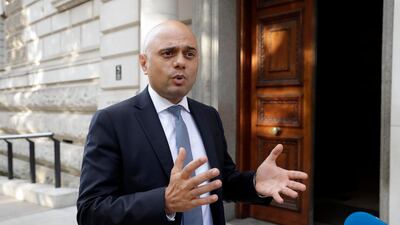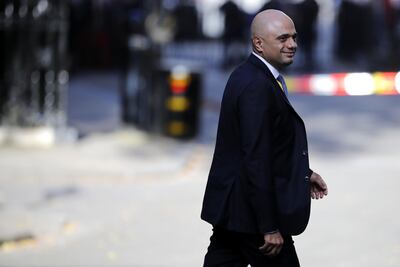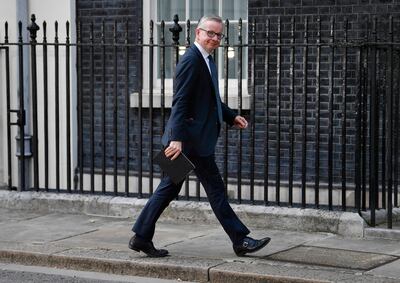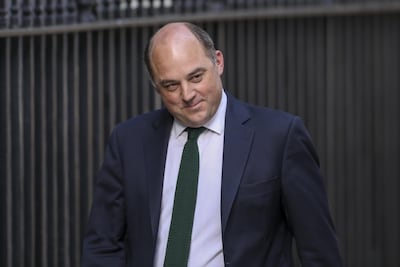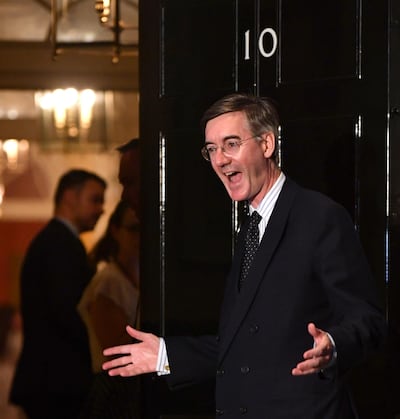UK Prime Minister Boris Johnson is making dramatic changes at the top of government.
So far, 16 ministers under his predecessor Theresa May have confirmed they will be leaving.
Mr Johnson’s Cabinet negotiations seemed to falter at the start when he was turned down by his main rival, former foreign secretary Jeremy Hunt.
After reportedly being offered the post of defence secretary, Mr Hunt held out to at least keep his post, but a deal was not coming.
Former defence secretary Penny Mordaunt, international trade secretary Liam Fox and business secretary Greg Clark have all said they would leave their roles, declining to serve in Mr Johnson's Cabinet.
They joined former chancellor Philip Hammond and Department for International Development head Rory Stewart, who said earlier that they would not serve under Mr Johnson.
The first confirmations for Mr Johnson’s top team are coming in. They are:
Sajid Javid Chancellor of the Exchequer
Known as "Saj" by those close to him, Mr Javid has become the most senior Remain-voting member of the new Cabinet.
The former Home Secretary, he has long been rumoured to be angling for a move next door to Mr Johnson as Chancellor of the Exchequer.
A former banker who worked in Asia and the US, Mr Javid epitomises the Conservative ideal that social mobility is attainable through hard work and a business-friendly mindset.
Mr Javid, 49, was a contender to be prime minister but was knocked out in the fourth round of voting. He then threw his weight behind Mr Johnson.
In the leadership contest, he was keen to portray himself as the classic Conservative Party success story. He pointed out the differences between his upbringing and his rivals’ privileged backgrounds at exclusive private schools.
Born in northern England to Pakistani immigrant parents and raised as a Muslim, he lived in a small flat above a shop.
Mr Javid recently said his mother did not speak English when she arrived in the UK because girls in her village did not go to school.
At a party event in west London last month, he said he relied on local services a great deal as a child.
But showing his Conservative credentials, he said the way to fund them was “through a dynamic, market, free-enterprise economy that’s competitive, that creates jobs, that creates wealth".
Mr Javid spoke about small businesses, the sort his parents would have run, and the need to ensure that they could be allowed to prosper in tax-friendly conditions.
He perhaps could offer a much-needed dose of reality to Mr Johnson.
“Even if we deliver Brexit on time, by the end October, that is not the end of it," Mr Javid said in July.
"I don’t believe that the electorate are going to give us some big reward for delivering something we said we were going to do anyway. I think we are kidding ourselves if we think that."
He urged the Conservative Party to create a “credible plan” or it would not be rewarded at a general election.
Mr Javid will be faced with stabilising an economy that could slip into a recession if the new government pursues a no-deal Brexit.
How much resistance he might give to his new boss, if a clean break from the EU is decided, remains to be seen.
Michael Gove – Chancellor of the Duchy of Lancaster
The most unpredictable relationship in British politics is that between Mr Johnson and Michael Gove, who was Wednesday an ambiguous role in the cabinet office as Chancellor of the Duchy of Lancaster.
Mr Johnson feared Mr Gove, the Environment Secretary and a former ally, would be his rival in the contest with his public speaking skills and pro-Brexit stance.
There were concerns that Mr Gove could humiliate Mr Johnson through personal attacks if they had regular public debates.
The two men used to be very close. Mr Gove ran Mr Johnson’s campaign to become prime minister in 2016 after the Brexit vote.
But there was confusion when he turned on his friend and announced his ill-fated campaign to become Conservative leader.
“I wanted to help build a team behind Boris Johnson so that a politician who argued for leaving the European Union could lead us to a better future,” he said when announcing his candidacy.
“But I have come, reluctantly, to the conclusion that Boris cannot provide the leadership or build the team for the task ahead. I have, therefore, decided to put my name forward for the leadership.”
Now they will team up again as Mr Gove takes on the role of Chancellor of the Duchy of Lancaster, effectively the Deputy Prime Minister.
It is a remarkable return to front-line political life.
Even Mr Gove was surprised when he became environment secretary in a 2017 Cabinet reshuffle by former prime minister Theresa May.
He came third in the 2019 leadership race, hit to an extent by an admission that he had taken drugs in the past, but presented with polished public speeches.
Dominic Raab – Foreign Secretary and First Secretary of State
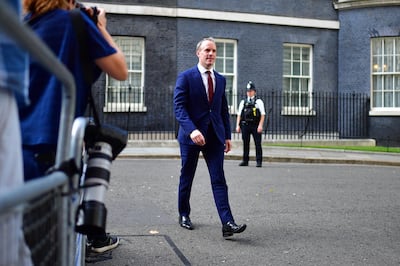
Dominic Raab was the only contender in the race to lead the Conservative Party who had stronger pro-Brexit views than the new prime minister.
Mr Johnson has sought to keep him onside with promotion to foreign minister.
Although he has little Middle East experience, Mr Raab spent six years as a government lawyer in the Foreign Office when the legal position on preparations for the Iraq war was the hottest issue in politics.
He has defended his role by saying he worked under Elizabeth Wilmshurst, a senior Foreign Office lawyer who resigned after warning that the war plan was illegal.
In Mrs May's government, Mr Raab spent four months as the minister in charge of Brexit.
While there he managed to confuse the Red Sea – which runs from Egypt’s Suez canal to Bab Al Mandeb off Yemen – with the Irish Sea when talking about trade barriers with Europe in a parliamentary session.
After Mr Raab came last in the second round of the leadership race, the staunch eurosceptic stated his backing for Mr Johnson.
His predecessor, Mr Hunt, left in the middle of a worsening stand-off with Iran over captured tankers.
Mr Hunt won around a third of votes in a ballot of Conservative Party members, but refused to become defence minister, a demotion from his post as foreign secretary.
Mr Raab comes with a background of dealing and negotiating with senior international figures.
He quit the job as Brexit minister last November over the withdrawal agreement with the EU, which he said would leave the UK too closely aligned to the bloc.
In his resignation letter, he slammed the “indefinite” Northern Irish backstop, an insurance arrangement to stop a hard border on Ireland, which is hated by pro-Brexit figures.
In a televised debate in the early stages of the leadership race, Mr Raab was keen to burnish his credentials as the man who could stand up to Brussels and renegotiate the withdrawal agreement.
He courted controversy as the first top-rank politician to argue suspending parliament could force a no-deal Brexit through, even though most MPs are strongly against a clean break from the EU.
Mr Raab's other prior foreign office experience includes working as a lawyer and adviser on the Arab-Israeli conflict, EU law and Gibraltar. He reflected on his time in the Middle East in a 2010 blog.
Elected to parliament in the same year, Mr Raab despaired over the state of the peace process. “Israel must find a way to extricate herself from a conflict that saps her strength, and compounds her isolation,” the Conservative parliamentarian wrote.
He also worked at The Hague, focusing on bringing in suspected war criminals including Slobodan Milosevic, Radovan Karadzic and Charles Taylor.
Diplomats may be concerned about Mr Raab criticising the now-former UK ambassador to the US, Sir Kim Darroch, after leaked memos in which he described President Donald Trump’s administration as “inept".
Mr Raab said the comments were too personal.
On Tuesday, he said it was important to have a strong relationship with the US and Mr Trump.
“I’m proud that we’ve got an American president who, when he last came here, had a lot of warm things to say about this country,” Mr Raab told Channel 4.
“He’s been a contentious figure but if you want strong relationships between the people of this country and the people of the United States of America, we want to get from the back of the queue to the front of the queue for a trade deal.
"I think it’s good to have warm relations.”
Ben Wallace – Defence Secretary
Ben Wallace, a frontbench MP for the past 12 years and former British Army officer, is the new Secretary of Defence.
Mr Wallace, a loyal Brexiteer, has been rewarded by Mr Johnson for his steadfast support during the recent Conservative leadership contest.
The Member for Lancaster and Wyre was a commissioned officer in Northern Ireland during the 1990s and went on to postings in Germany, Central America and Cyprus, said Forces Network, a news outlet for the army.
“As a former officer with the Scots Guards, it is an honour to take up this role at the Ministry of Defence,” Mr Wallace said after his appointment.
"I look forward to getting started and meeting colleagues from across the department and our military."
He has served as Home Office Minister for Security and Economic Crime since 2016, making statements on anti-terrorism matters and the civil war in Syria.
At the start of July, Mr Wallace told Sky News that ISIS and Al Qaeda remained serious threats to the West and its allies.
“Everyone has potentially an ISIS problem in every country around the world,” he said.
“It is a different type of threat because at the moment it's manifesting itself in lone actors."
Mr Wallace voted in favour of extending UK military action against ISIS in Syria, but has said he did not support the Britain’s decision to go to war with Iraq in 2003.
Mr Wallace has visited Iran several times and makes no secret of his interest in the country.
He has also spoken out against Israel's illegal occupation of Palestine.
Mr Wallace's predecessor, Ms Mordaunt, served in the post for only 85 days.
Others
Other Cabinet appointments decided on by Mr Johnson and his adviser Dominic Cummings are:
Brexit secretary: Stephen Barclay
International Trade Secretary: Liz Truss
Health secretary: Matt Hancock
Education Secretary: Gavin Williamson
Culture Secretary: Nicky Morgan
Business Secretary: Andrea Leadsom
Housing Secretary: Robert Jenrick
Work and Pensions Secretary: Amber Rudd
Justice Secretary: Robert Buckland
International Development Secretary: Alok Sharma
Transport Secretary: Grant Shapps
Welsh Secretary: Alun Cairns
Scottish Secretary: Alister Jack
Northern Ireland Secretary: Julian Smith
Leader of the House of Lords: Baroness Evans.
Leader of the House of Commons: Jacob Rees-Mogg
Party Chairman: James Cleverly
